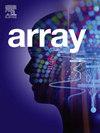A hybrid approach for cervical cancer detection: Combining D-CNN, transfer learning, and ensemble models
IF 4.5
Q2 COMPUTER SCIENCE, THEORY & METHODS
引用次数: 0
Abstract
Cervical cancer is the leading cause of cancer-related death among women worldwide, although it is easily preventable through early detection and treatment. This paper proposed deep learning techniques, specifically transfer learning, deep convolutional neural networks (D-CNNs), and ensemble learning for automating cervical cancer detection and classification. Specifically, we evaluate the performance of four deep convolutional neural networks architectures: AlexNet, ZfNet, HighwayNet, and LeNet-5, as well as four transfer learning architectures: EfficientNetB0, ResNet50, MobileNetV2, and DenseNet201. The dataset was preprocessed from the beginning. For this, we performed error level analysis (ELA) on the dataset to ensure that no patterns were missed within each image. We also performed augmentation on the dataset (resizing, rescaling, flipping, rotation, zooming, and contrasting). It is possible to achieve improved diagnostic accuracy using deep learning on the multi-cancer dataset. Comparative studies were conducted in a very short time to investigate the accuracy of these architectures. Based on performance comparisons, we propose a novel hybrid ensemble model AZL which combines AlexNet, ZfNet, and LeNet to overcome individual model limitations. We compared all these models in an experimental format. Our experimental results show that the AZL ensemble model achieved a classification accuracy of 99.92 %, outperforming individual D-CNN and transfer learning models in terms of precision, recall, and F1-score. These findings highlight the effectiveness of ensemble deep learning approaches in improving cervical cancer diagnosis. Our developed method holds promise to help pathologists diagnose this disease in a timely manner, especially given the limited resources. Ultimately, it is capable of accurately detecting and classifying cervical cancer, which contributes to reducing mortality.
宫颈癌检测的混合方法:结合D-CNN、迁移学习和集成模型
子宫颈癌是全世界妇女癌症相关死亡的主要原因,尽管通过早期发现和治疗很容易预防。本文提出了深度学习技术,特别是迁移学习、深度卷积神经网络(d - cnn)和集成学习,用于自动化宫颈癌检测和分类。具体来说,我们评估了四种深度卷积神经网络架构的性能:AlexNet、ZfNet、HighwayNet和LeNet-5,以及四种迁移学习架构:EfficientNetB0、ResNet50、MobileNetV2和DenseNet201。数据集从一开始就进行了预处理。为此,我们对数据集进行了错误水平分析(ELA),以确保每张图像中没有遗漏任何模式。我们还对数据集进行了增强(调整大小、重新缩放、翻转、旋转、缩放和对比)。在多癌症数据集上使用深度学习可以提高诊断的准确性。在很短的时间内进行了比较研究,以调查这些架构的准确性。基于性能比较,我们提出了一种新的混合集成模型AZL,它结合了AlexNet、ZfNet和LeNet来克服单个模型的局限性。我们以实验形式比较了所有这些模型。实验结果表明,AZL集成模型的分类准确率达到99.92%,在准确率、召回率和f1分数方面优于单个D-CNN和迁移学习模型。这些发现突出了集成深度学习方法在改善宫颈癌诊断方面的有效性。我们开发的方法有望帮助病理学家及时诊断这种疾病,特别是在资源有限的情况下。最终,它能够准确地发现和分类子宫颈癌,这有助于降低死亡率。
本文章由计算机程序翻译,如有差异,请以英文原文为准。
求助全文
约1分钟内获得全文
求助全文

 求助内容:
求助内容: 应助结果提醒方式:
应助结果提醒方式:


